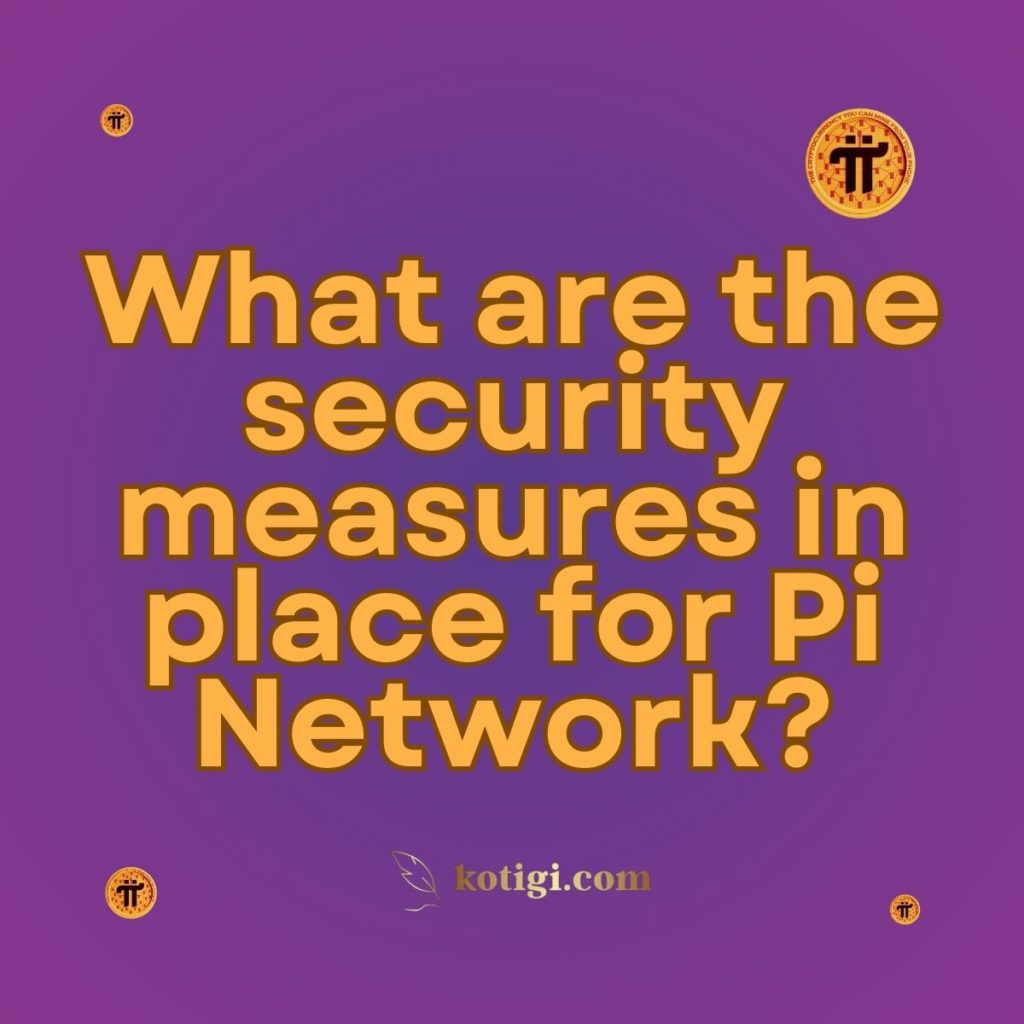
What are the security measures in place for Pi Network?
Pi Network prioritizes user security through encryption, decentralized validation, KYC verification, and Security Circles. These measures protect users’ assets and personal data while fostering a trust-based ecosystem for secure transactions.
Introduction
As Pi Network continues to grow, the need for robust security mechanisms is critical. With over 50 million engaged Pioneers (Pi users), Pi Network employs a combination of decentralized blockchain technology, encryption, and identity verification (KYC) to ensure that the platform is secure, reliable, and resilient against external threats. This post delves into Pi Network’s unique security structure, its decentralized nature, and the various measures in place to protect users’ data, assets, and the overall integrity of the network.
Comparison table of Pi Network Security Measure vs Other Cryptos
Here’s a table summarizing the key security measures of Pi Network and comparing them with other major blockchain networks:
| Security Measure | Pi Network | Bitcoin | Ethereum | Ripple (XRP) |
|---|---|---|---|---|
| Decentralization | Utilizes Stellar Consensus Protocol with decentralized nodes to secure the network | Fully decentralized with Proof-of-Work (PoW) | Transitioning from Proof-of-Work to Proof-of-Stake (PoS) via Ethereum 2.0 | Partially decentralized with unique consensus algorithm (Ripple Protocol Consensus Algorithm) |
| Security Circles | Trust-based Security Circles for user validation and to prevent fake accounts | Not applicable | Not applicable | Not applicable |
| KYC Verification | Mandatory KYC for users, ensuring real identity participation | No KYC required for mining or transactions | No KYC required for mining or transactions | KYC required for exchanges and certain transactions |
| Transaction Validation | Stellar Consensus Protocol (SCP) with trusted nodes | Proof-of-Work (PoW), secured by miners | Proof-of-Stake (PoS) validators | Ripple Protocol Consensus Algorithm secures the network |
| Encryption | Advanced encryption of user data and transactions | Transaction data is encrypted within blockchain | Transaction data is encrypted within blockchain | Transaction data is encrypted within blockchain |
| Fraud Prevention | Security Circles and KYC help prevent fake accounts, bots, and fraud | Prevented through decentralized PoW mining | Validators prevent fraud via staking penalties | Consensus mechanism prevents fraudulent transactions |
| Energy Efficiency | Highly energy-efficient due to SCP, which doesn’t rely on mining | Energy-intensive due to Proof-of-Work (mining) | Moving toward energy-efficient PoS | Energy-efficient due to unique consensus mechanism |
| User Privacy | Privacy protected through encryption and KYC | Pseudonymous transactions, but no formal KYC | Pseudonymous transactions, but no formal KYC | Private transactions with KYC where applicable |
| Wallet Security | Pi Wallet uses private and public key encryption for protection | Wallets use private/public keys for security | Wallets use private/public keys for security | Wallets use private/public keys for security |
| Scalability | Designed to scale securely with more nodes and Security Circles | Scalability is limited by the PoW mechanism | Ethereum 2.0 aims to solve scalability issues | Ripple’s consensus allows for rapid transaction scalability |
This table compares Pi Network’s security features against well-known blockchain networks, highlighting Pi’s unique mechanisms such as Security Circles and KYC verification that distinguish it from more traditional networks like Bitcoin and Ethereum.
Decentralized Security: A Fundamental Aspect of Pi Network
Decentralization lies at the heart of Pi Network’s security. Unlike centralized systems, Pi’s blockchain operates through a distributed ledger, where multiple participants validate and secure transactions.
Understanding Decentralized Security
Decentralized security refers to the process by which Pi Network leverages a vast number of independent users, called nodes, to verify and secure all transactions. No single entity controls the network, which reduces the risk of data breaches, hacks, or system failures.
How Decentralization Protects the Pi Network
Pi Network’s decentralized nature offers protection against common vulnerabilities seen in centralized systems. By distributing the control of the network across many nodes, it becomes virtually impossible for hackers to take over the network. This structure prevents a single point of failure, a key advantage of blockchain technology over traditional financial systems.
The Role of Nodes in Pi’s Security
Nodes are independent users or devices connected to Pi Network that play an essential role in securing the platform. These nodes validate transactions, maintain the blockchain’s integrity, and ensure that no fraudulent activities, such as double-spending or fake transactions, occur.
Consensus Mechanism: A Core Pillar of Pi’s Security
Pi Network uses the Stellar Consensus Protocol (SCP) to facilitate secure and efficient transaction validation. In SCP, trusted nodes reach a consensus on transaction validity, reducing the need for energy-intensive Proof-of-Work (PoW) mechanisms while maintaining high security.
The Role of Security Circles in Pi Network
Pi Network introduces the concept of Security Circles, a unique approach to enhancing security while building trust within the network.
What Makes Security Circles Unique?
Security Circles are groups of 3 to 5 trusted individuals within Pi Network that a user personally knows and can vouch for. These circles play a crucial role in validating transactions and ensuring that only trusted individuals are part of the network.
Enhancing Security Through Trust-Based Circles
By relying on personal trust within a user’s Security Circle, Pi Network creates a web of trusted relationships that secures the platform. This system ensures that only legitimate users participate in mining Pi and prevents bad actors from infiltrating the network.
Preventing Fake Accounts with Security Circles
Security Circles act as a layer of verification to prevent fake accounts from infiltrating the system. Since members of a Security Circle need to personally know each other, it becomes challenging for malicious actors to create multiple fake accounts and undermine the integrity of the network.
Building Stronger Security Circles
Pioneers can enhance the security of their Pi account by adding trustworthy individuals to their Security Circle. By building a reliable circle of known users, each participant contributes to the overall security of the network, ensuring safer transactions and preventing unauthorized access.
KYC (Know Your Customer) Verification and its Importance
In addition to decentralized security and Security Circles, Pi Network incorporates Know Your Customer (KYC) verification, ensuring that only real individuals are participating in the network.
What is KYC, and Why Does it Matter?
KYC (Know Your Customer) is a process where Pi Network verifies the identity of its users to ensure they are legitimate individuals. This process helps prevent illegal activities such as money laundering, fraud, and the creation of fake accounts.
Why KYC is Essential for Pi’s Long-Term Success
As Pi Network grows and moves towards the mainnet phase, the KYC process becomes increasingly important for the long-term sustainability of the network. KYC ensures that each user is a verified human, preventing bots or automated systems from abusing the platform.
Implementing KYC in Pi Network
Pi Network uses a third-party KYC solution where users upload their identification documents, such as passports or national IDs. The system uses artificial intelligence to verify the authenticity of these documents and matches them against the user’s selfie.
Security Benefits of the KYC Process
The KYC process helps prevent malicious actors from exploiting the platform. By verifying each user’s identity, Pi Network ensures that transactions are conducted by real individuals, reducing the risk of scams, identity theft, and the proliferation of fake accounts.
Encryption and Data Security in Pi Network
Encryption is another critical aspect of Pi Network’s security framework. By encrypting sensitive data, Pi ensures that user information and assets are protected from unauthorized access.
Why Encryption is Crucial for Pi Network
Encryption is vital for any cryptocurrency network because it safeguards user privacy and ensures that financial transactions cannot be tampered with. Without encryption, hackers could potentially access sensitive data or manipulate transactions, undermining trust in the network.
How Pi Network Uses Encryption
Pi Network employs advanced encryption techniques to protect user data and transaction details. All communication between the Pi app and its servers is encrypted using secure encryption protocols, ensuring that data cannot be intercepted by malicious actors.
What Type of Data is Encrypted in Pi Network?
Data such as user credentials, wallet information, and transaction history are all encrypted within Pi Network’s system. This ensures that sensitive information remains protected, even if unauthorized access were attempted.
Pi Wallet Security: Protecting Your Assets
Pi Network’s wallet is protected using private and public keys. The private key is known only to the user and is never stored on Pi’s servers. This decentralized approach to wallet security ensures that users have complete control over their assets.
How Pi Network Prevents Fraud, Hacks, and External Threats
As with any online platform, Pi Network faces the risk of cyber-attacks and fraud. However, the network has implemented several security measures to mitigate these risks.
Fraud Prevention Techniques in Pi Network
Pi Network combats fraud by ensuring that each user undergoes KYC verification and by utilizing decentralized nodes for transaction validation. Additionally, the platform relies on Security Circles to detect and prevent fraudulent activity from spreading within the network.
Protecting Pi Network Against Hacks
Pi Network uses encryption, decentralized nodes, and secure key management to prevent unauthorized access to user data and wallets. This multi-layered approach reduces the likelihood of hacking attempts succeeding, as hackers would need to compromise multiple security measures simultaneously.
Privacy Protection for Pi Users
In addition to encryption, Pi Network follows strict privacy protocols to ensure that users’ personal data remains confidential. Information collected during the KYC process is stored securely and used only for verification purposes.
What Happens in the Event of a Security Breach?
If Pi Network detects a potential security breach, it can temporarily halt transactions and isolate affected nodes. This rapid response helps contain the damage and protect user funds while the issue is investigated and resolved.
The Future of Security in Pi Network
As Pi Network scales and enters the mainnet phase, security remains a top priority. The platform’s development team is focused on implementing new technologies and protocols to further strengthen the network’s security infrastructure.
Future Security Enhancements for Pi Network
In the future, Pi Network may implement additional layers of security such as multi-factor authentication (MFA), enhanced encryption standards, and even hardware wallet support to further protect users’ Pi assets.
Scaling Pi Network Without Compromising Security
As Pi Network grows, its decentralized architecture allows it to scale securely without compromising on speed or user experience. Each new node added to the network contributes to its overall security, ensuring that the system remains robust and resilient against external threats.
Users’ Role in Maintaining Pi’s Security
Users are crucial in maintaining Pi’s security by following best practices, such as creating strong passwords, securing their private keys, and participating actively in their Security Circles. The decentralized nature of Pi Network makes every user a key player in safeguarding the platform’s integrity.
Conclusion
Pi Network has developed a robust and multi-faceted security framework designed to protect user data, assets, and the overall integrity of the platform. Through decentralized validation, Security Circles, encryption, and KYC verification, Pi Network ensures a secure and trusted ecosystem for its users. As the network continues to grow, Pi remains committed to implementing cutting-edge security measures to protect the community and prevent potential threats. Users also play a critical role in maintaining this security by participating in Security Circles and adhering to best security practices.
Key Takeaways:
- Pi Network employs decentralized security, encryption, and KYC verification to protect its platform.
- Security Circles act as a unique trust-based mechanism to prevent fake accounts.
- The KYC process ensures that only verified individuals participate in the network.
- Pi Network’s use of encryption safeguards user data and transaction information.
- Pi Network continuously enhances its security measures to adapt to future challenges.




